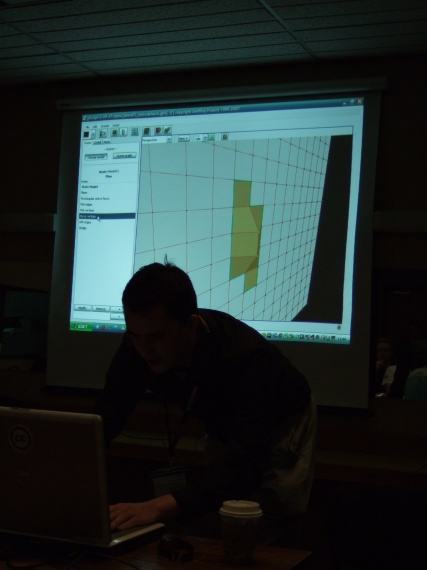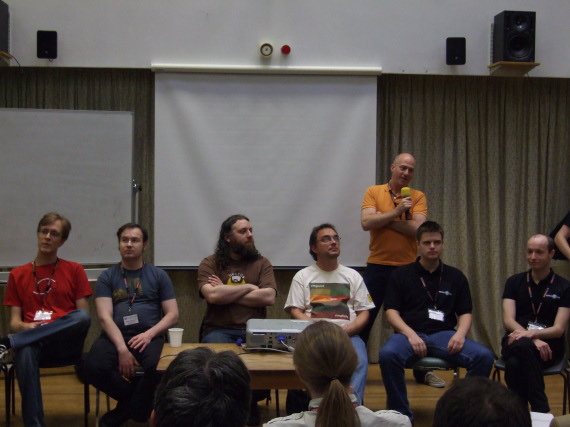EuroPython 2010: Registrations, Submissions, Organisation
Friday, March 5th, 2010Every year, I seem to get involved with the organisation of the EuroPython conference, and this year doesn’t seem to be an exception. Like last year’s conference, EuroPython 2010 will take place in Birmingham, United Kingdom, and seeks to gather a respectable number of European Python users and developers under one roof by offering stimulating and engaging talks on the use of Python in various fields, the development of Python technologies (including the steadily increasing number of implementations), and other matters of a broader technological and cultural nature. As well as the talks, there will again be a number of tutorials, and after the main conference days (19th-22nd July) the sprinting begins: as most conference-going Free Software developers know, this is where people use the opportunity to collaborate with others to get some serious programming done on their favourite projects.

Birmingham's mercantile architecture
For some of us, it can often be quite hard to think a few months ahead and to consider signing up for a conference, not to mention the idea of submitting a talk proposal and then putting something together to present to a large number of other people, and especially this latter notion can seem overwhelming: when high-profile and/or successful projects are likely to appear in the schedule – after all, Python is almost everywhere now – one might question whether anyone would be interested in my software or my experiences with Python when there are supposedly so many important people presenting their important stuff. Well, in my experience at least, some of the most interesting talks and some of the most interesting discussion topics outside the talks frequently occur around people who aren’t minor community celebrities and whose issues aren’t announced with a fanfare. Discovering these hidden depths of Python usage is frequently what make conferences really worth attending. For an idea of the breadth of talks at EuroPython, take a look at those given at EuroPython 2008 and 2009: they aren’t all about big name projects or crucial decisions taken by Python’s core development team.

Geoffrey French presenting gSculpt: an interesting application that would probably go unnoticed by many
I wrote an article about organising EuroPython in 2008 for The Python Papers Vol 4 No 1 (2009), and if you don’t mind downloading a PDF, you can obtain it directly from the journal in question. In this article, I mention a number of talks that probably wouldn’t get the kind of promotion that one sees in the “blogosphere”, yet the topics (game development, code analysis, compilation, using “cloud computing” resources to solve real problems) are definitely things that would have many people returning home after the conference and taking a closer look at what the presenters have been doing. And frequently, the keynote speakers provide perspectives beyond those of software development and even inspiration for developers looking to solve problems which may be new to them, but which are very real to others: this truly makes a form of technology transfer possible in a way that those of us who support Free Software should approve, not based on parcelling out products but based on the transfer of expertise to where it’s most needed.
So if you’re interested in Python, as a beginner, a regular user, or as an expert, and you’re looking for a conference where there will be plenty of things to see, learn and do, and you’re also looking for a community-style experience instead of the more corporate-style conference events, and you would prefer a slant towards Free Software – and I think it isn’t unreasonable to claim that EuroPython encourages and emphasises Free (and open source) Software – then why not consider coming along to EuroPython 2010 this summer? And if you’re looking to make connections within the community, which is what many regard as the primary benefit of community conferences like EuroPython, why not join the organisers in putting the event together? That way, you’ll not only make connections with some fairly well-connected people, but you’ll also help shape the event into something that benefits you even more!

The Python implementations panel at EuroPython 2009
Helping to organise a conference can be hard work, but the end result can pay back this effort with interest. With this being my fifth year of being in some way involved with the running of EuroPython itself, I feel somewhat qualified to make this claim. Why not start your own investment with EuroPython 2010, or perhaps start one with your own favourite technology’s community conference? You might make connections and influence people, too.